There is no doubt that healthcare is one of the noblest, yet also one of the toughest professions in the world. Historically, healthcare was a heap of paperwork, phone calls, and fragments. For many patients, their healthcare journey seems to be a case of complex events tied together as part of a patient’s healthcare journey, with doctors, nurses, and specialists working in silos.
The healthcare industry, however, is undergoing a drastic makeover based on an idea borrowed from the business realm. It is called Customer Relationship Management (CRM), a service that solves the messy problem of paperwork.
Building Strong Doctor-Patient Relationships
The one thing that builds a strong doctor-patient relationship is ‘availability’ – we understand that and do everything in our power to make you available. That’s a principle, of course, that extends beyond the clinic; it reverberates to the core of service in any field.
Creating good customers is like any other relationship. They build up over time — you invest in them with real effort and real time daily. Buyers are willing to pay more for products they trust, and it shows: In Salsify’s 2025 consumer survey report titled “When Browsing Becomes Buying,” a full 87% said they were making purchases based on the manufacturer.
If businesses realize that building relationships is precious, they form a long-lasting tie with their customers.
Unfortunately, many patients don’t get the required availability, attention, or compassion they deserve, due to the exhausted workers carrying unrealistically heavy workloads. That’s where a CRM system steps in. In a field where trust and connection matter most, a well-implemented customer relationship management tool becomes indispensable. A carefully selected CRM in healthcare provides the architecture for organizing patient interaction history in one place, so staff can access the full picture at a glance.
What Is CRM in Healthcare & Its Features?
In healthcare, a CRM is a safe and accessible online place to store patient interactions, automate communication, and generate reports to provide better care.
Unlike traditional CRMs, healthcare-based solutions manage appointments, treatment plans, referrals, health reminders, billing, and compliance – all specific to the needs of the medical market.
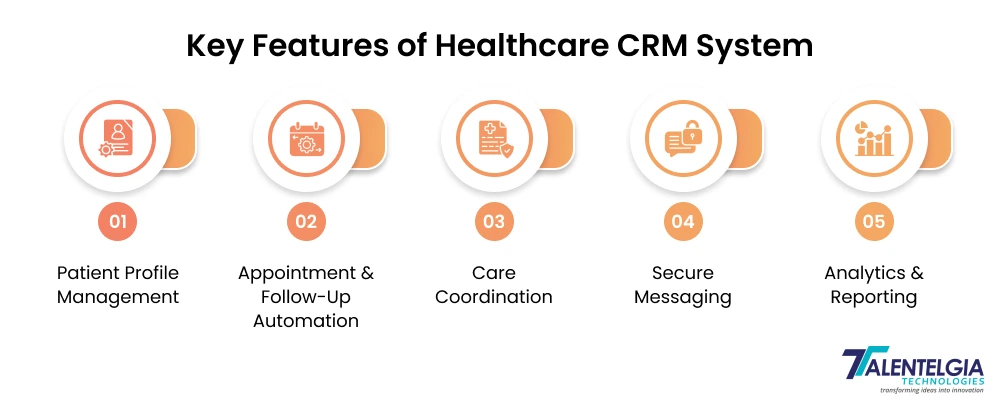
They’re like having a smart assistant working in your favor, giving your staff all they need to provide better care and putting your office on complete autopilot.
CRM Features in the Healthcare Industry
- Patient Profile Management: Consolidates patient histories, contact details, appointment schedules, and personal memos.
- Appointment & Follow-Up Automation: Reminds patients of check-ups, refills, and care milestones.
- Care Collaboration: Provides teams with a common view of patient information for more efficient care handoffs and delivery.
- Secure Messaging: Meets privacy laws (such as HIPAA) while allowing safe chat between patients and providers.
- Analytics & Reporting: Follows up on results, engagement reports, and operational performance.
What Is the Difference Between EHR and CRM?
Though both Healthcare CRM (Customer Relationship Management) systems and EHR (Electronic Health Records) are important digital assistants to medical practices, they serve different utilities for care providers, practice staff, and patients.
EHR (Electronic Health Record)
EHR stands for Electronic Health Record — the digital version of a patient’s paper chart, primarily focusing on clinical aspects. It holds medical history, diagnoses, medications, allergies, lab results, and treatment plans.
EHRs capture, store, and process real-time data that improve the care of individual patients while keeping medical records in a secure digital repository. If you’re looking to understand the complete cost structure behind EHR implementation, including what factors influence pricing and how to plan effectively, you can explore this detailed guide on EHR Implementation Cost Breakdown.
CRM (Customer Relationship Management)
In contrast, CRM within the healthcare arena focuses on the larger relationship that extends beyond clinical encounters. It handles communication, engagement, reminders, outreach marketing, and feedback.
With CRM, care becomes proactive and tailored to each patient—helping organizations build trust, manage follow-ups, and meet individual health needs well before a patient enters the exam room.
Comparison Table
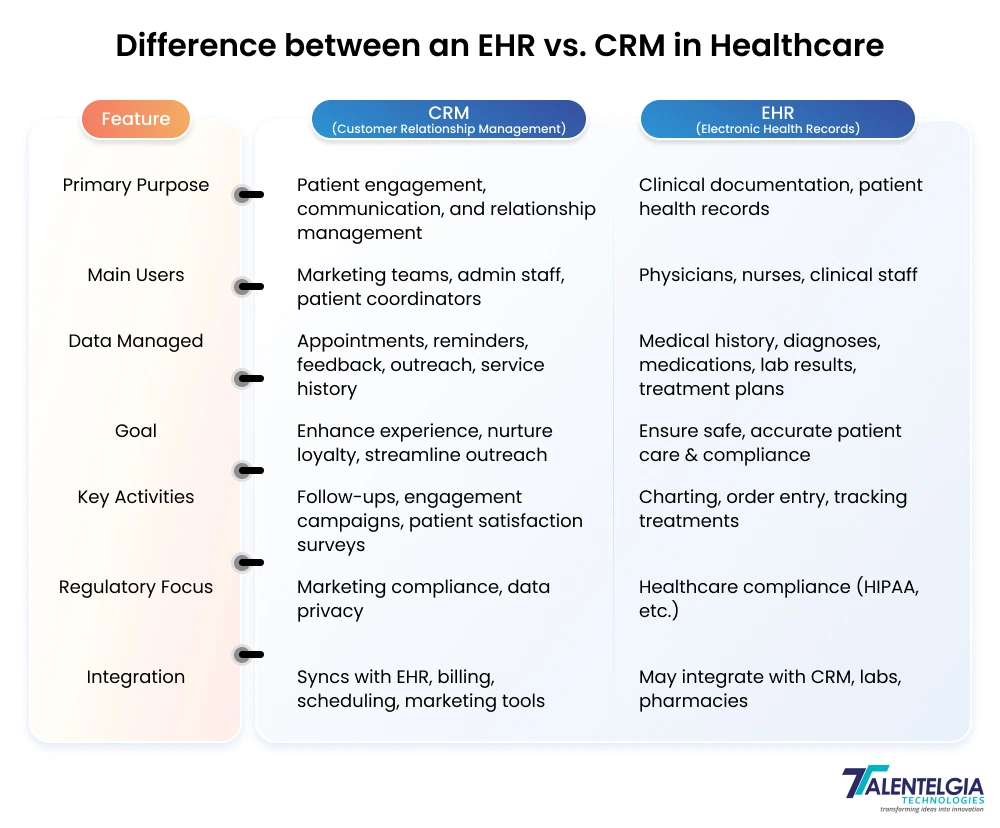
8 Real-world Uses of CRM in Healthcare
Paper charts and callback oversights are a thing of the past. In healthcare, a CRM enables teams to proactively anticipate patients’ needs, send personalized communications (reminders, wellness tips, post-visit care), and deliver transparent service at every stage of the treatment journey.
This approach enhances the patient experience, reduces anxiety, and builds trust.
1. Boost Patient Acquisition
Attracting new patients is supported in CRM solutions through optimized outreach, automated marketing campaigns, and lead tracking. Healthcare organizations can extend their reach, engage prospects, and create long-standing relationships from the start.
2. Promote Patient Engagement
CRM platforms drive patient engagement through timely nudges, customized wellness content, and easy scheduling. Engaged patients are more likely to adhere to care plans and healthy behaviors.
3. Strengthen Patient Loyalty
CRM allows real-time, personalized follow-ups. By turning one-off interactions into continuous care, patients feel valued, leading to natural loyalty toward your practice.
4. Save Time & Resources
Automating administrative tasks such as appointment reminders and follow-ups frees staff from repetitive tasks and minimizes costly errors.
5. Enhance Communication
Unified messaging ensures that no patient, provider, or care team member is left behind, ensuring seamless communication from diagnosis to discharge.
6. Ensure Digital Compliance
Healthcare CRMs come equipped with top-of-the-line security and compliance measures to keep you aligned with HIPAA and patient privacy standards.
7. Automate Feedback Collection
Automatic surveys and feedback requests can be sent post-appointment, allowing quick insights into patient satisfaction and care quality.
8. Enhance Resource Distribution
CRM analytics and reporting help organizations deploy staff, equipment, and funds where most needed—streamlining workflows and ensuring top-quality care.
Also Read: Best Future Business Ideas for Healthcare
Challenges Addressed By Healthcare CRM Systems
Health systems and hospitals use CRM in healthcare not only for current operations but to plan for future patient needs. Despite digital advancements, many organizations still face persistent issues that affect growth and service quality.
Fortunately, next-generation healthcare CRMs help overcome these challenges.
1. Limited Visibility Into Operational Metrics
Healthcare providers often lack a 360-degree view of key metrics like appointment adherence, patient outcomes, and revenue cycles.
Answer: CRM systems compile operational information into intuitive dashboards, improving visibility and helping organizations make better decisions.
2. Disjointed Marketing & Sales Processes
When patient outreach is managed manually, appointments fall through the cracks, and marketing efforts are wasted.
Solution: CRM systems integrate marketing, scheduling, and patient communication to optimize branding and improve patient acquisition by up to 30%.
3. Fragmented Data Management
Patient data scattered across EHRs, billing systems, and paper files makes care management error-prone.
Solution: CRM systems consolidate patient and operational information into a secure, integrated platform to reduce errors and speed up workflows.
Summary
CRM in healthcare is not just another IT upgrade; it’s a game-changer. CRM technology connects doctors, patients, and providers with clarity, care, and efficiency — bringing human relationships back to the heart of medicine.
The future of CRM in healthcare looks bright, where AI-driven solutions will anticipate patient needs, automate care plans, and deliver proactive outreach. Integration with telehealth and remote monitoring will deepen, and patient portals will become smarter and more engaging.
As data ownership moves to patients, CRM will be their direct gateway to personalized, value-based health.
Are you ready to establish relationships that define great healthcare?
Select our Custom CRM development services and reach out to us to explore our custom solutions.


 Healthcare App Development Services
Healthcare App Development Services
 Real Estate Web Development Services
Real Estate Web Development Services
 E-Commerce App Development Services
E-Commerce App Development Services E-Commerce Web Development Services
E-Commerce Web Development Services Blockchain E-commerce Development Company
Blockchain E-commerce Development Company
 Fintech App Development Services
Fintech App Development Services Fintech Web Development
Fintech Web Development Blockchain Fintech Development Company
Blockchain Fintech Development Company
 E-Learning App Development Services
E-Learning App Development Services
 Restaurant App Development Company
Restaurant App Development Company
 Mobile Game Development Company
Mobile Game Development Company
 Travel App Development Company
Travel App Development Company
 Automotive Web Design
Automotive Web Design
 AI Traffic Management System
AI Traffic Management System
 AI Inventory Management Software
AI Inventory Management Software
 AI Software Development
AI Software Development  AI Development Company
AI Development Company  AI App Development Services
AI App Development Services  ChatGPT integration services
ChatGPT integration services  AI Integration Services
AI Integration Services  Generative AI Development Services
Generative AI Development Services  Natural Language Processing Company
Natural Language Processing Company Machine Learning Development
Machine Learning Development  Machine learning consulting services
Machine learning consulting services  Blockchain Development
Blockchain Development  Blockchain Software Development
Blockchain Software Development  Smart Contract Development Company
Smart Contract Development Company  NFT Marketplace Development Services
NFT Marketplace Development Services  Asset Tokenization Company
Asset Tokenization Company DeFi Wallet Development Company
DeFi Wallet Development Company Mobile App Development
Mobile App Development  IOS App Development
IOS App Development  Android App Development
Android App Development  Cross-Platform App Development
Cross-Platform App Development  Augmented Reality (AR) App Development
Augmented Reality (AR) App Development  Virtual Reality (VR) App Development
Virtual Reality (VR) App Development  Web App Development
Web App Development  SaaS App Development
SaaS App Development Flutter
Flutter  React Native
React Native  Swift (IOS)
Swift (IOS)  Kotlin (Android)
Kotlin (Android)  Mean Stack Development
Mean Stack Development  AngularJS Development
AngularJS Development  MongoDB Development
MongoDB Development  Nodejs Development
Nodejs Development  Database Development
Database Development Ruby on Rails Development
Ruby on Rails Development Expressjs Development
Expressjs Development  Full Stack Development
Full Stack Development  Web Development Services
Web Development Services  Laravel Development
Laravel Development  LAMP Development
LAMP Development  Custom PHP Development
Custom PHP Development  .Net Development
.Net Development  User Experience Design Services
User Experience Design Services  User Interface Design Services
User Interface Design Services  Automated Testing
Automated Testing  Manual Testing
Manual Testing  Digital Marketing Services
Digital Marketing Services 
 Ride-Sharing And Taxi Services
Ride-Sharing And Taxi Services Food Delivery Services
Food Delivery Services Grocery Delivery Services
Grocery Delivery Services Transportation And Logistics
Transportation And Logistics Car Wash App
Car Wash App Home Services App
Home Services App ERP Development Services
ERP Development Services CMS Development Services
CMS Development Services LMS Development
LMS Development CRM Development
CRM Development DevOps Development Services
DevOps Development Services AI Business Solutions
AI Business Solutions AI Cloud Solutions
AI Cloud Solutions AI Chatbot Development
AI Chatbot Development API Development
API Development Blockchain Product Development
Blockchain Product Development Cryptocurrency Wallet Development
Cryptocurrency Wallet Development About Talentelgia
About Talentelgia  Our Team
Our Team  Our Culture
Our Culture 
 Healthcare App Development Services
Healthcare App Development Services Real Estate Web Development Services
Real Estate Web Development Services E-Commerce App Development Services
E-Commerce App Development Services E-Commerce Web Development Services
E-Commerce Web Development Services Blockchain E-commerce
Development Company
Blockchain E-commerce
Development Company Fintech App Development Services
Fintech App Development Services Finance Web Development
Finance Web Development Blockchain Fintech
Development Company
Blockchain Fintech
Development Company E-Learning App Development Services
E-Learning App Development Services Restaurant App Development Company
Restaurant App Development Company Mobile Game Development Company
Mobile Game Development Company Travel App Development Company
Travel App Development Company Automotive Web Design
Automotive Web Design AI Traffic Management System
AI Traffic Management System AI Inventory Management Software
AI Inventory Management Software AI Software Development
AI Software Development AI Development Company
AI Development Company ChatGPT integration services
ChatGPT integration services AI Integration Services
AI Integration Services Machine Learning Development
Machine Learning Development Machine learning consulting services
Machine learning consulting services Blockchain Development
Blockchain Development Blockchain Software Development
Blockchain Software Development Smart contract development company
Smart contract development company NFT marketplace development services
NFT marketplace development services IOS App Development
IOS App Development Android App Development
Android App Development Cross-Platform App Development
Cross-Platform App Development Augmented Reality (AR) App
Development
Augmented Reality (AR) App
Development Virtual Reality (VR) App Development
Virtual Reality (VR) App Development Web App Development
Web App Development Flutter
Flutter React
Native
React
Native Swift
(IOS)
Swift
(IOS) Kotlin (Android)
Kotlin (Android) MEAN Stack Development
MEAN Stack Development AngularJS Development
AngularJS Development MongoDB Development
MongoDB Development Nodejs Development
Nodejs Development Database development services
Database development services Ruby on Rails Development services
Ruby on Rails Development services Expressjs Development
Expressjs Development Full Stack Development
Full Stack Development Web Development Services
Web Development Services Laravel Development
Laravel Development LAMP
Development
LAMP
Development Custom PHP Development
Custom PHP Development User Experience Design Services
User Experience Design Services User Interface Design Services
User Interface Design Services Automated Testing
Automated Testing Manual
Testing
Manual
Testing About Talentelgia
About Talentelgia Our Team
Our Team Our Culture
Our Culture
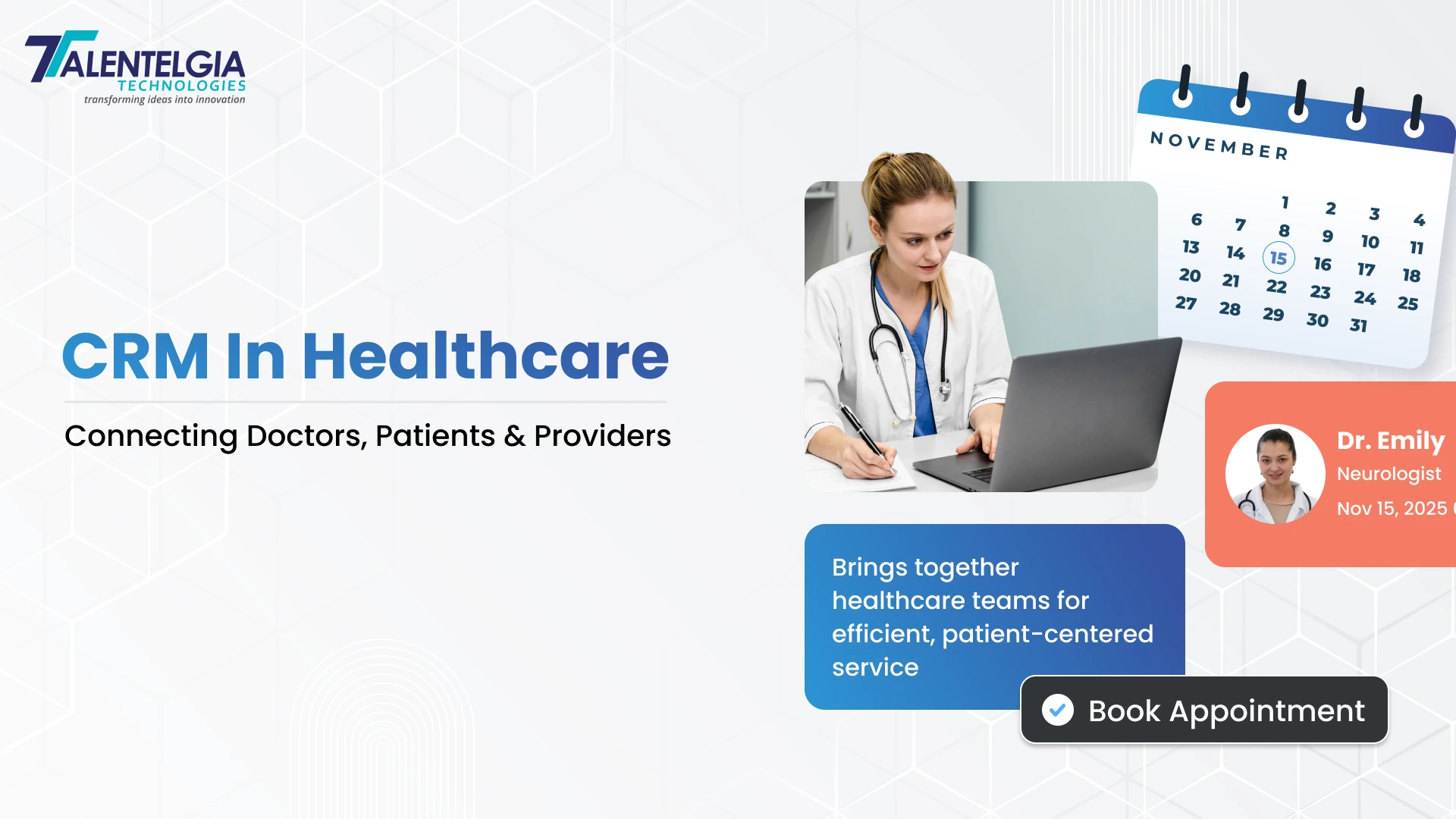

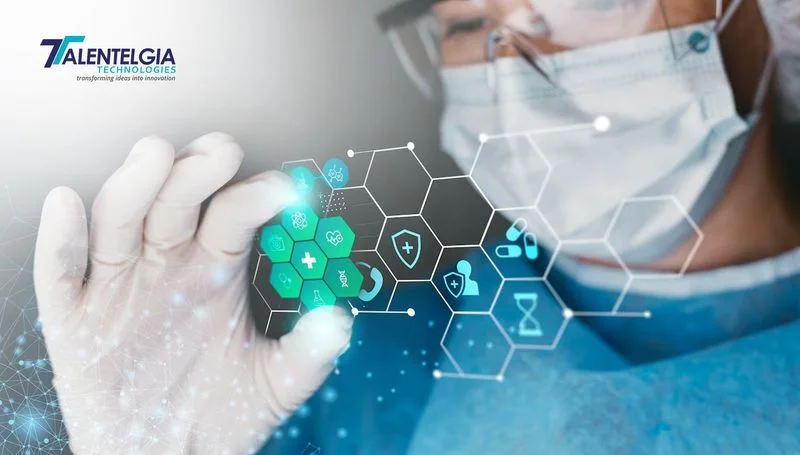

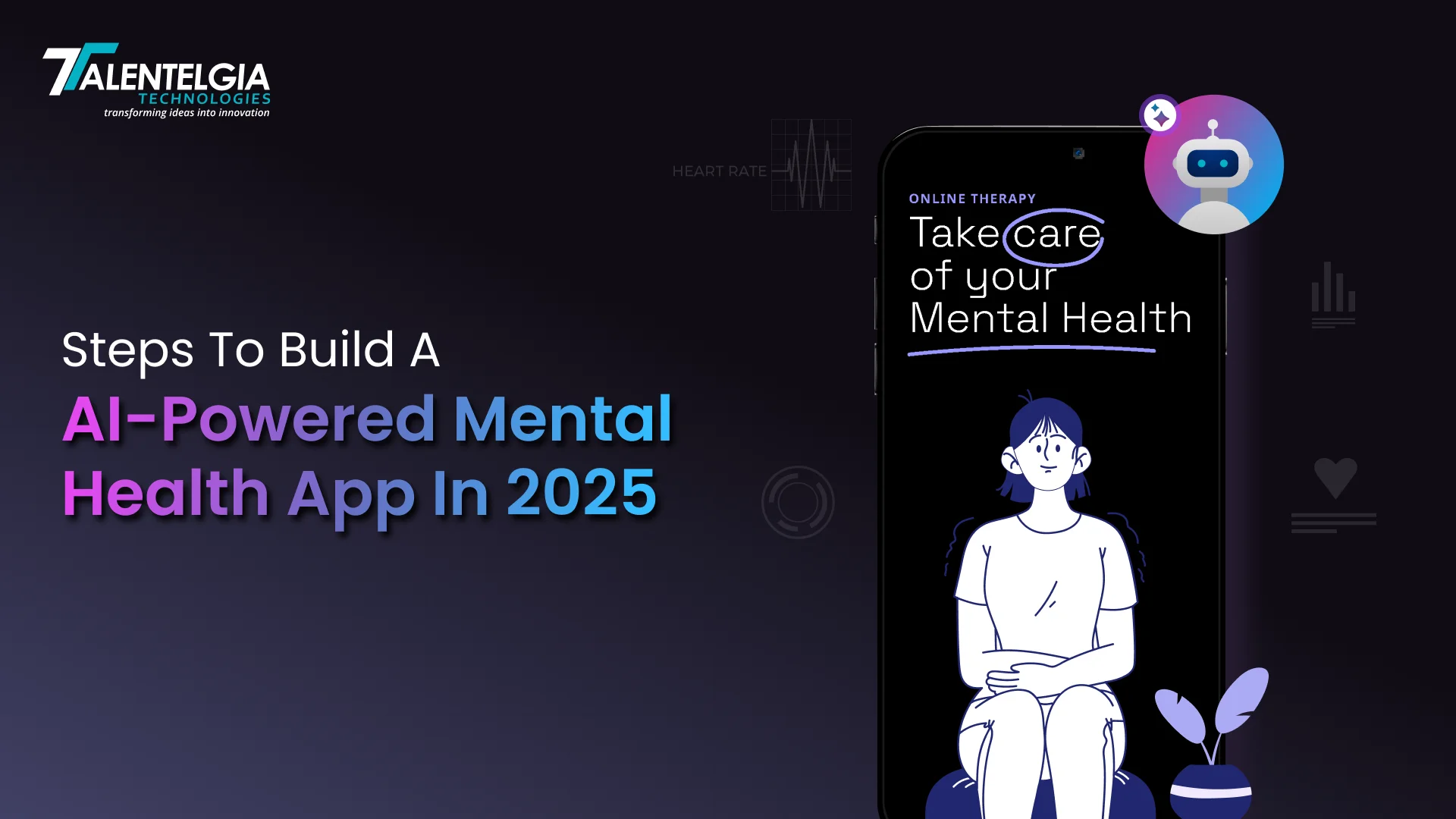
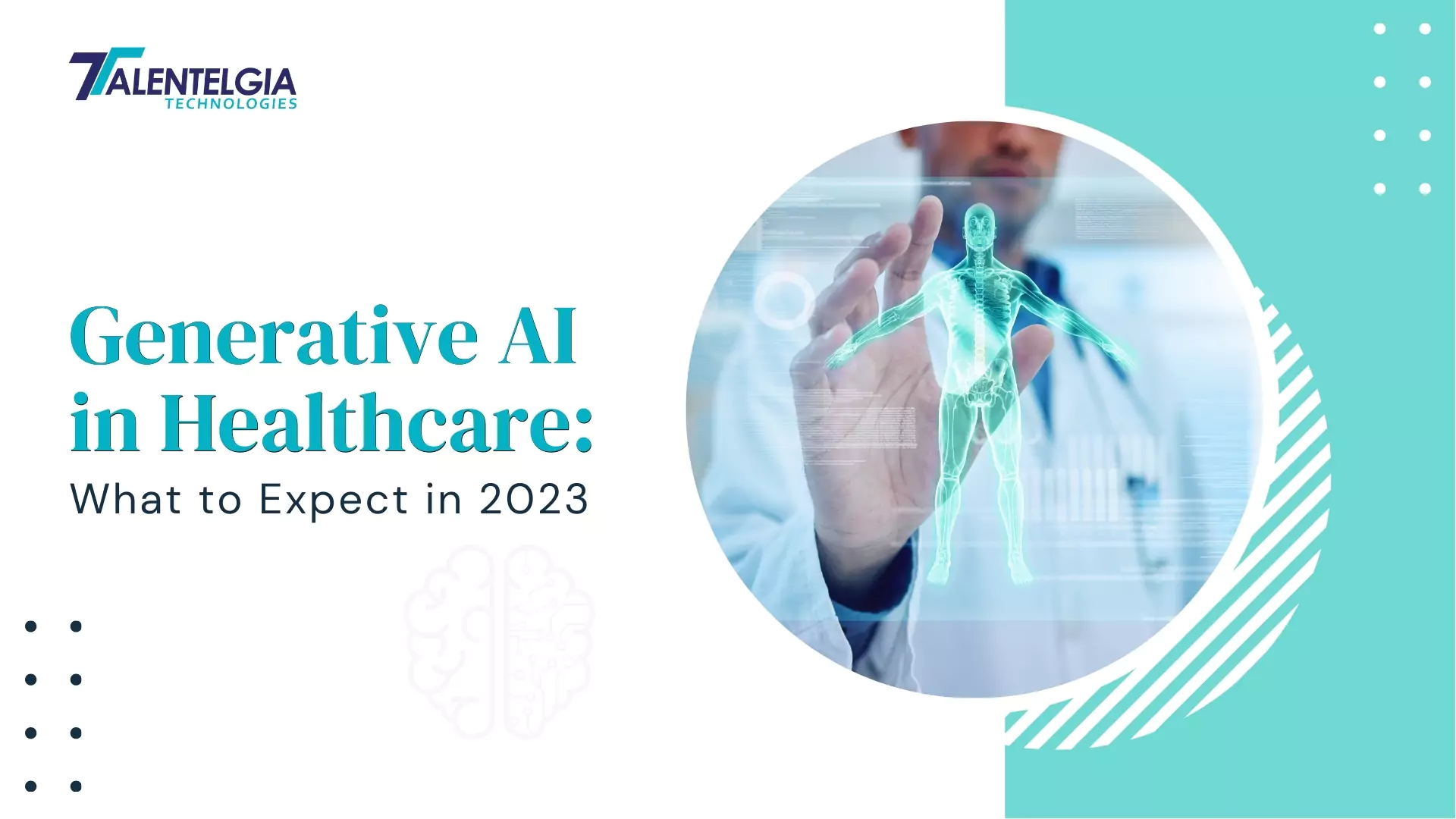











 Write us on:
Write us on:  Business queries:
Business queries:  HR:
HR: 




